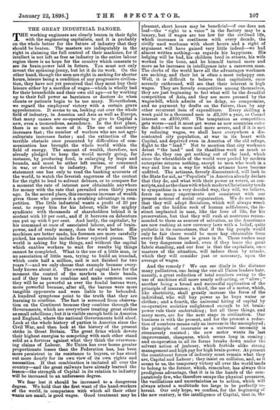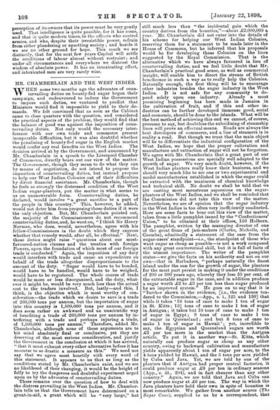THE GREAT INDUSTRIAL DANGER T HE working engineers are clearly beaten
in their fight with the engineering capitalists, and it is probably on the whole better for the future of industry that they should be beaten. The masters are indisputably in the right in claiming the full control of their machines, for if intellect is not left as free as industry in the entire labour region there is no hope for the country which consents to see its brain-power laid in fetters. You must not only invent the spinning-jenny, but let it do its work. On the other hand, though the men are right in seeking for shorter hours, leisure being a condition of any progressive civilisa- tion, they have not yet perceived that they must buy their leisure either by a sacrifice of wages—which is wholly bad for their households and their own old age—or by working up to their full power as barristers or doctors do when clients or patients begin to be too many. Nevertheless, we regard the employers' victory with a certain grave apprehension. It seems to us, looking out over the whole field of industry, in America and Asia as well as Europe, that many causes are co-operating to give to Capital a new, even a tremendous, ascendency. In the first place, there is so much more of it. The use of machinery increases fast ; the number of workers who are not agri- culturists increases faster ; and the extinction of the terrible obstacle once presented by difficulties of com- munication has brought the whole world within the field of energy. The amount of wealth, therefore, not already pledged to keep the world merely going, for instance, by producing food, is enlarging by leaps and bounds, and must be either left useless, or consumed in war, or devoted to industry. For proof of this statement one has only to read the banking accounts of the world, to watch the feverish eagerness of the contest for the right to lend to solvent debtors, or to compare for a moment the rate of interest now obtainable anywhere for money with the rate that prevailed even thirty years ago. In the second place, this enormous increase of wealth gives those who possess it a crushing advantage in com- petition. The little industrial wants a profit of 20 per cent. to repay him for his labour, while the mighty syndicate with thousands of shareholders behind it is content with 10 per cent., and if it borrows on debenture can put up with 6 per cent. And lastly, the capitalist, by his command at once of associated labour, and of brain- power, and of ready money, does the work better. His machines are better made, his foremen are more carefully picked, his materials include fewer rejected pieces. The world is asking for big things, and without the capital which enables workers to wait for results big things cannot be completed. What is the use of a little man, or an association of little men, trying to build an ironclad, which costs half a million, and is not finished for two years ?—and we only choose that example because every- body knows about it. The owners of capital have for the moment the control of the markets in their hands, and if they learn to combine and make common cause they will be as powerful as ever the feudal barons were, more powerful because, after all, the barons were more tangible opponents and were liable to be beheaded. A hundred symptoms point to the truth that they are learning to combine. The fact is screened from observa- tion on the Continent because they combine through the Governments, which are everywhere treating great strikes as small rebellions ; but it is visible enough both in America and England, where the national Governments hold aloof. Look at the whole history of parties in America since the Civil War, and then look at the history of the present strike in Great Britain. The great firms which devote their highest energies to competing with each other stand solid as a fortress against what they think the overween- ing claims of Labour. No Union has ever borne greater proportionate losses than the Federation has, has been more persistent in its resistance to buyers, or has stood out more dourly for its own view of its own rights and necessities. If that combination is imitated all over the country—and the great railways have already learned the lesson—the strength of Capital in its relation to industry will be increased to an unforeseen degree.
We fear lest it should be increased to a dangerous degree. We hold that the first want of the hand-workers of the world, in comparison with which all their other wants are small, is good wages. Good treatment may be pleasant, short hours may be beneficial—if one does not loaf—the "right to a voice" in the factory may be a luxury, but if wages are too low for the civilised life, which increases in costliness with every decade, the civilly used workman with short hours and a right of argument will have gained very little indeed—we had almost written nothing—as regards his happiness. His lodging will be bad, his children bred in streets, his wife worked to the bone, and he himself turned more and more as he increases in intelligence into a careworn man. The clerks of the world have all the advantages workmen are seeking, and their lot is often a most unhappy one. Well, it is difficult to believe that capitalists, once serenely enthroned, will see that their interest is high wages. They are fiercely competitive among themselves, they are just beginning to feel what will be the dreadful competition of Asia, and they are more pressed by the wages-bill, which admits of no delay, no compromise, and no payment by drafts on the future, than by any other recurrent item of expenditure. Every shilling a week paid to a thousand men is £2,500 a year, or Consol interest on £100,000. The temptation as competition gets worse—and it must get worse as new countries enter the field—will be more and more severe, and if it is met by reducing wages, we shall have everywhere a dis- contented city population, at war in its heart with Capital, and deprived even in America of the old refuge, flight to the "land." Not to mention that city workmen detest "the land" and its thankless work as much as Jews do, they can get nothing out of the land, which since the wheatfields of the world were pooled by modern enterprise returns nothing, except to men who work in a way and live in a way for which artisans have become unfitted. The artisans, fiercely discontented, will look to the State for aid, as "Populists" in America already declare that they do, and what with their power as voters, as con- scripts, and as the class with which modern Christianity tends to sympathise in a very decided way, they will, we believe, force on many experiments not consistent with our present notions of social organisation. We do not mean that they will adopt Socialism, which will always wreck itself on the hidden rock of human selfishness, the in- stinct implanted in man, like the love of life, for his preservation, but that they will rush at nostrums recom- mended to them as sources of salvation, as the Americans are now rushing at new currency laws with a belief, quite pathetic in its earnestness, that if the big people would only be fair there would be more hay obtainable from every field than there is grass in it. Those rushes may be very dangerous indeed, even if they leave the great fabric standing, and our fear is that the capitalists, once masters of the situation, will induce them by attacks, which they will consider just or necessary, upon the average of wages.
And the remedy ? We can see dimly in the distance many palliatives, one being the one all Union leaders hate, namely, a great reduction of total numbers owing to the use of machines still more nearly self-acting, or" alive ; " another being a, broad and successful application of the principle of insurance ; a third, the use of a motor, which, like electricity, shall greatly increase the force of the individual, who will buy power as he buys water or clothes ; and a fourth, the universal hiring of capital by co-operative societies enlightened enough to let brain- power rule their undertaking ; but all these things, and many more, are for the next stage in civilisation. Our business is with the present, and for the present a reduc- tion of numbers means only an increase in the unemployed; the principle of insurance as a universal necessity is strenuously resisted ; the new motor wants its last improvement, cheapness, which seems long in coming ; and co-operation in all its forms breaks down under the solvent action of jealousy, which forbids alike strong management and high pay for high brain-power. At present the constituent forces of industry must remain what they are, Capital and Labour ; they insist on collision, and, as it seems to us, the temporary victory all over the world tends to belong to the former, which, remember, has always this prodigious advantage, that it is in the hands of the com- paratively few, who therefore escape the physical pressures, the vacillations and uncertainties as to action, which will always attend a multitude too large to be perfectly co- herent. Our only hope, we confess, for the beginning of the new century, is the intelligence of Capital, that is, the perception of its owners that its power must be -very gently used. That intelligence is quite possible, for it has come, and that in quite modern times, to the officers who control armies, and who, despite their irresistible power, refrain from either plundering or upsetting society ; and beside it we see no other ground for hope. This much we see distinctly, that for the next few years Capital will settle the conditions of labour almost without restraint; and under all circumstances and everywhere we distrust the wisdom of absolute power. It has an intoxicating effect, and intoxicated men are very rarely wise.







































 Previous page
Previous page